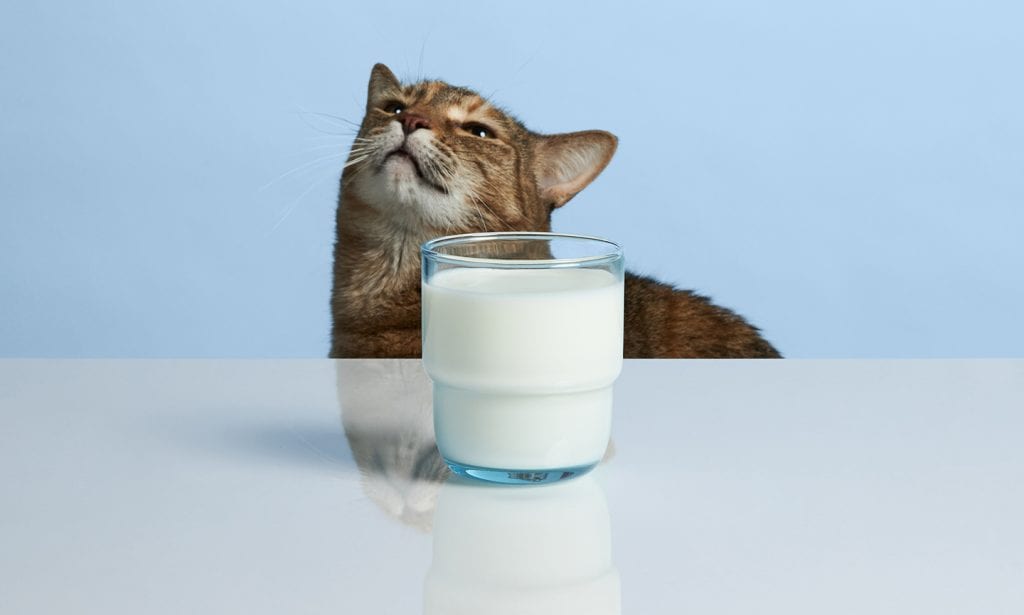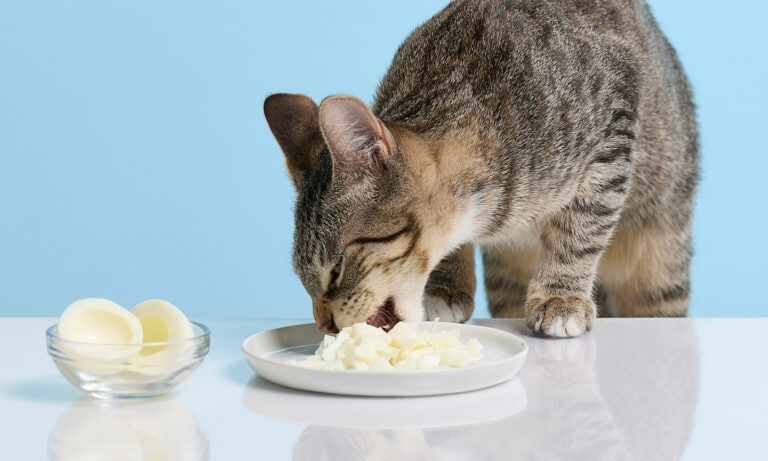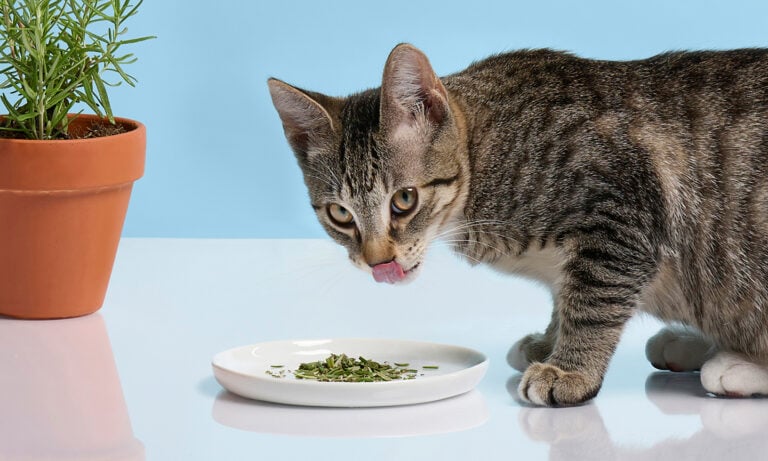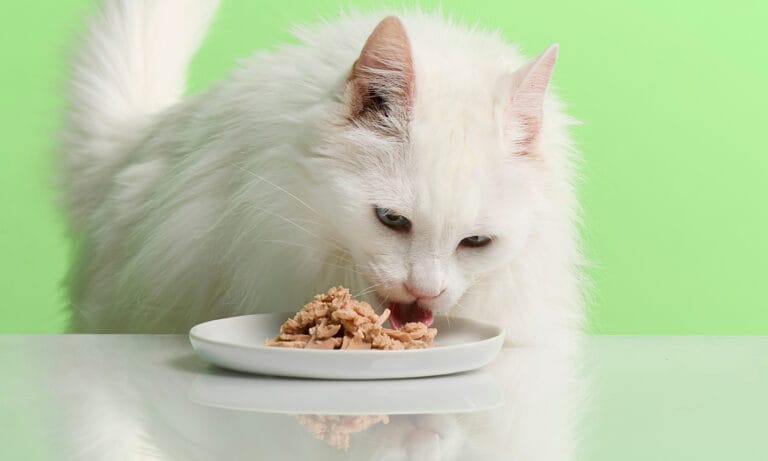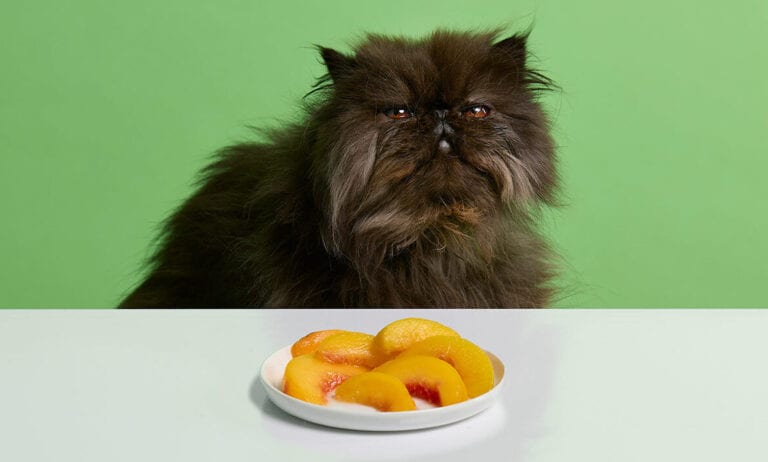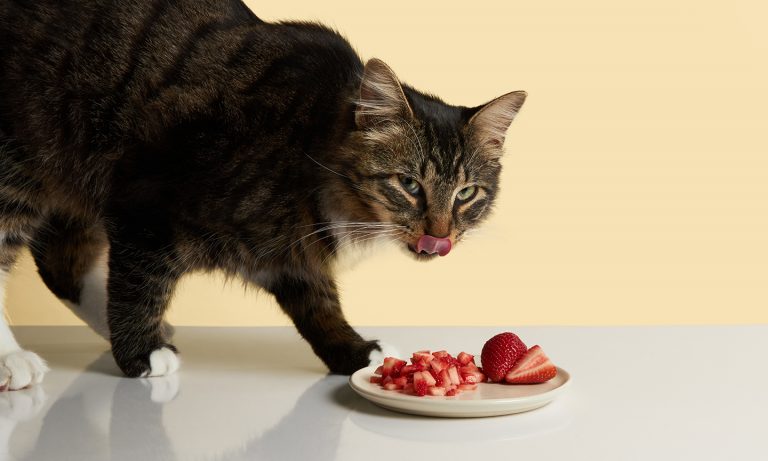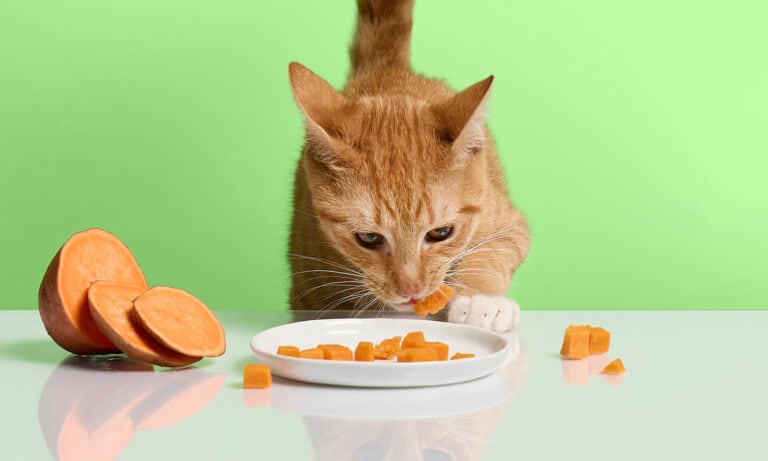Got milk and want to share some with kitty? Better hold off before pouring a saucer of milk.
While, technically, adult cats can drink milk, they really shouldn’t. Many are lactose intolerant and sloshing down the stuff can have pretty negative results. As for whiskered wee ones, the best food for kittens is mom’s milk or a milk replacer that has just the nutrition little cats need.
All About Cats and Milk
Can Cats Drink Milk?
You’re slurping some nice, cold cow’s milk and look down to see that funny feline face peering up at you. Why not give kitty a taste, too? Hold on.
“Just because [cats] can [drink milk], [it] doesn’t mean they should,” says Dr. Deborah Bayazit, DVM, co-owner and medical director of Brilliant Veterinary Care in New York City.
Many cats are lactose intolerant, Dr. Bayazit points out, “and just like a person with the condition, if given milk, they’ll suffer for it. You are rolling the dice waiting to see if they get something, like horrible diarrhea.”
There are some exceptions, however. Furry friends who tolerate cow’s milk and really like it could sip some as an occasional cat treat, and your vet may recommend lactose-free cat milk to aid a cat who isn’t eating solid food well and needs to gain weight.
Kittens, on the other hand, should not be given cow’s milk, says Dr. Bayazit, adding that “the best food for them is their mama’s milk.”
If they’re feral or were abandoned, your go-to is a milk replacer.
“Until at least 4 to 5 weeks or so, they should have that,” says small animal vet Dr. Sarah Wooten, DVM, CVJ based in Silverthorne, Colorado. “Milk replacers have the nutrients they need, and are specifically designed to mimic the mother cat’s milk.”
Bottom line: Cow’s milk doesn’t give kittens the necessary nourishment for overall health.
Downsides of Milk for Cats
First off, banish that image of the cute cat lapping up milk. This is one of those human foods that’s not a good idea, says Dr. Wooten.
“Many cats lose the lactase enzyme needed to digest milk after weaning and that’s when they become lactose intolerant,” she says.
If they drink milk, or if cats eat dairy products, they might experience an upset stomach or loose stool, says Dr. Wooten. They could also get diarrhea, which could bring on dehydration.
“Diarrhea can be a bigger problem for kittens,” Dr. Wooten says. “They’re so little, so [they] can get dehydrated quickly.” Kittens may also have a hard time digesting cow’s milk, due to the proportions of casein and whey proteins in cow’s milk.
Pet parents of lactose-intolerant cats might see the following unpleasant reactions:
- Gas
- Bloating
- Vomiting
- Loose stool
- Upset stomach
- Abdominal pain
- Diarrhea, which could bring on dehydration
- Weight gain or obesity due to milk’s high fat content
And for cats with dairy allergies, they might also experience:
- Red or itchy skin
Some cats, on the other hand, don’t get adverse reactions from a bit of milk. “They’re fond of it, and don’t have negative effects,” says Dr. Bayazit. Should a cat lap up too much milk, however, they may fill up and not get a balanced diet, Dr. Bayazit adds.
Benefits of Milk for Cats
If you have the odd cat that isn’t intolerant, doesn’t have dairy allergies and doesn’t get GI problems, there can be a few benefits to giving milk. They include:
- Cats like the taste of milk: They find it palatable, says Dr. Bayazit, adding that “they’re drawn to the protein and fat in milk.” But be sure to give it to cats infrequently, she adds, “never every day.”
- Milk has protein and calcium: So, a very small amount once in a blue moon can be a healthy snack.
- Milk supplement/cat milk may help them gain weight: Supplement, which is cow’s milk with most of the lactose stripped out, and essential cat nutrients, like taurine, added in may be recommended for cats needing to put on weight or with health issues making it hard to eat solids.
- Cat milk can make a great treat: Even cats who don’t have health problems but can’t handle dairy may enjoy lactose-free versions as treat options added to their cat food.
- Milk replacers are purrfect for kittens: For nursing kittens separated from their mothers too soon, kitten milk replacers are the unrivaled choice. “They’re designed to replicate the mama cat’s milk,” says Dr. Wooten, and can help them get the nutrition and calories they need. “It’s what their mom would be giving them,” adds Dr. Bayazit.
How to Feed Milk to Cats
Cats typically love milk, so getting them to lap it up shouldn’t be hard. Unfortunately, milk doesn’t always love them back.
If your cat absolutely adores milk, yet never gets those loathsome outcomes, dispensing cow’s milk as an occasional treat should be fine, says Dr. Bayazit. The operative word being “occasional.”
“You don’t want to give much and you don’t want to be giving it daily,” Dr. Bayazit adds.
For Adult Cats:
- Give small amounts: If they’re not lactose intolerant or allergic to dairy, you could give about one tablespoon once or twice a week, suggests Dr. Wooten.
- Present a milk substitute to cats over 8 weeks. If you get the OK from your vet, these mostly lactose-free alternatives can be a great treat choice and added to a meal when cats eat.
- Daily use of cat milk/milk substitute is usually OK, but follow your vet’s instructions and instructions on the milk products about how much to feed.
- Keep them hydrated. “Do supply plenty of water,” says Dr. Bayazit, because milk or cat milk don’t take the place of good ol’ H2
- Apply the 10 percent rule. No matter how much cats savor milk or milk substitutes, treats should take up no more than 10 percent of your purr baby’s daily calorie intake. Talk to your vet about your kitty’s dietary needs, and try this handy calorie calculator from the Pet Nutrition Alliance.
For Kittens:
- Feed milk replacers to kittens. While kittens can’t have straight cow’s milk, in lieu of their mom’s milk, youngsters not yet weaned can have kitten milk replacers designed to simulate the original. They’ll provide the sustenance needed for growing cats.
- Give replacers until completely weaned. Replacers are usually given until kittens have been fully weaned and have finished the transition over to solids (around 6 to 7 weeks of age or so).
- Adjust portions. The amount of supplement to feed will vary, according to individual kitty needs and age, but replacers are typically offered every three to four hours, initially, and about every eight hours for older kittens.
If you’re dishing out milk or milk supplements, consult with your veterinarian who can determine the right portion for your pet, and weigh in on cat health issues to keep in mind.
Top Milk Supplements for Cats
FAQs About Cats and Milk
Q: Why do cats drink milk?
A: Plain and simple: Cats drink milk because they like the taste.
“Their mom’s milk or formula are the only things they can digest when they’re small, so it’s probably normal once they get older to just like it,” says Dr. Wooten. Additionally, “milk’s got a high fat content, and plenty of protein, both of which cats love,” says Dr. Bayazit.
Q: How does milk affect cats?
A: “Many cats can’t manage cow’s milk,” says Dr. Wooten. Pet parents might see unpleasant reactions like:
- Gas
- Loose stool
- Upset stomach
- Diarrhea (which could bring on dehydration). “Diarrhea can be a bigger problem for kittens,” Dr. Wooten warns. “They’re so little, so can get dehydrated quickly.”
On the other hand, some fur babies don’t get adverse reactions from a bit of milk. “They’re fond of it, and don’t have negative effects,” notes Dr. Bayazit.
Q: What type of milk can cats drink?
A: “If they can’t get mom’s milk, kittens should only have milk replacer,” says Dr. Wooten. "Ideally, adults should stick with lactose free milk substitutes,” she adds. Unusual critters who don’t react negatively to cow’s milk could have a small amount (whole, skim, low fat) once in a while, but as Dr. Wooten points out, “it’s not recommended.”
Q: What's the difference between milk and milk supplement?
A: Milk is cow’s milk, whereas milk supplement can refer to either:
- Milk replacer (a liquid or powdered formula specifically for kittens).
- Or cat milk/milk substitute (cow’s milk with most of the lactose stripped out, and essential cat nutrients—like taurine added in).
Because many cats are lactose intolerant, cat milk supplements may also contain the enzyme lactase that breaks down the lactose inherent in milk. Much purrferred, so kitty won’t get ill, don’t you think?
Q: When and why should I give my cat milk supplement?
A: Here are four reasons you should give your cat milk supplement:
- If your furry one loves milk, but can’t take it full-fledged, furnish milk supplement as a treat.
- When you drink milk, if your pet’s intrigued, supplying supplement might be a way to bond with them, notes Dr. Bayazit. It’s a little something extra for your best bud. “Just remember, they still need to drink water,” she adds. Cats need access to enough water daily.
- “Vets may advise supplement for cats who aren’t eating well, or have health issues and need to put on pounds,” says Dr. Bayazit.
- Kittens, who don’t have their mother’s milk, but aren’t yet weaned, need a milk replacer. Your vet can tell you when to give, and replacers will have directions. Feeding frequency depends on the age and health of your kitty, ordinarily every 3 to 4 hours at first; every 8 hours when they’re older.
Q: Can cats have a spoonful of milk?
A: Sure, cats can have a spoonful of milk, but at the risk of sounding like a broken record: It’s not recommended and only if there aren’t reactions.
“If you do dole it out, keep it to a tablespoon once or twice a week,” says Dr. Wooten. “Not kittens, though; they need formula.”
Q: How often can cats drink milk?
A: Kittens will need milk replacer throughout the day. With vet approval, adult cats who don’t get adverse responses could have a tablespoon of cow’s milk one or two times a week. Serve it like a treat and make sure it’s only 10 percent or less of your darling’s daily calorie intake. Regular use of cat milk is normally fine; and unless otherwise instructed, provide it like a treat. The product, and your vet, will have directions about feeding.
Q: What happens if a cat drinks too much milk?
A: Here’s the upshot on what could happen if your cat drinks too much milk:
- “Milk has a lot of fat, so cats can gain weight,” says Dr. Bayazit. “Plus, overdoing it can interfere with a balanced diet.”
- Lactose intolerant feline friends could have gas, diarrhea, vomiting, and abdominal pain.
- Dairy allergic felines may have the above, along with red or itchy skin.
Kittens can get diarrhea and dehydrate swiftly.
Human Foods Your Cat Can Eat:
Share:
